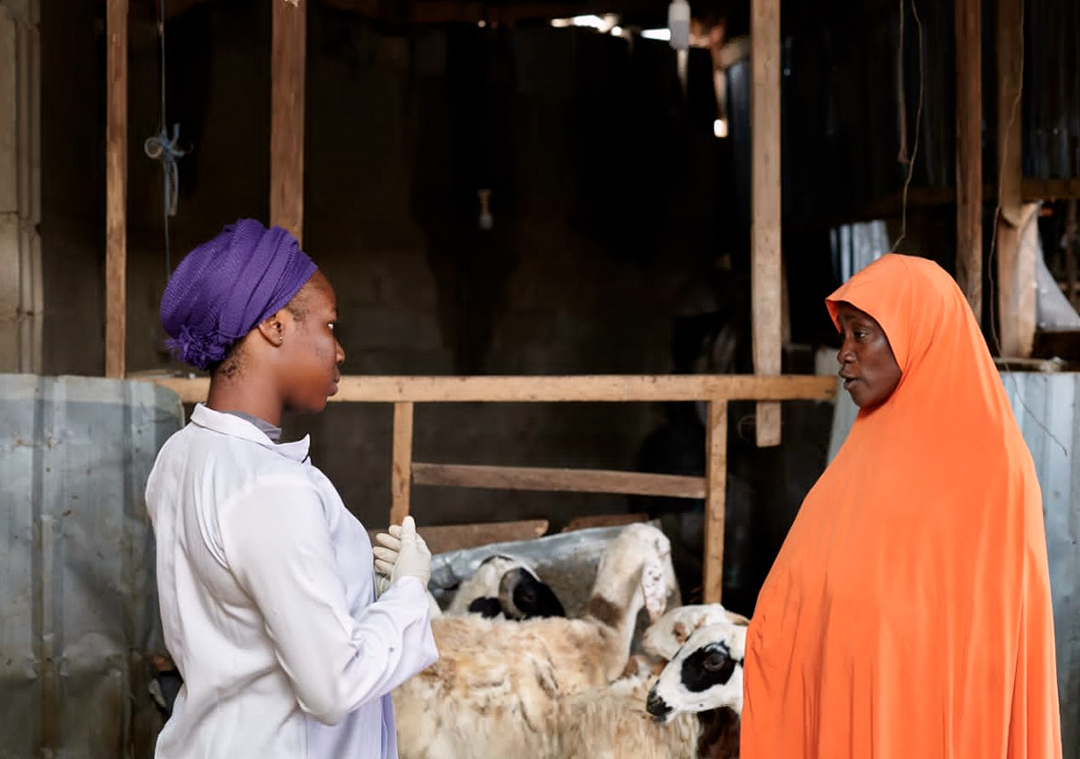Mobilizing human and animal health professionals to tackle gender-based violence
In response to the pervasiveness of gender-based violence in human and animal health domains, the Female leadership in One Health course by FAO's Virtual Learning Center for West Africa has engaged over 500 frontline animal and human health service providers from 10 West African countries through an interactive training module which addresses gender-based violence.
The pandemic of violence against women and girls is one of the greatest social, economic and development challenges facing the world today. Globally, a staggering one in three women experience physical or sexual violence by an intimate partner or sexual violence from a non-partner at some point in their life. Physical and mental health consequences are severe, impeding women’s full participation in and contributions to society. In rural communities, gender-based violence can undermine the implementation of One Health approaches at the grass-root level. For example, chronic pain resulting from violence may reduce a female poultry farmer's ability to implement biosecurity practices – measures crucial for protecting her flock against Avian Influenza as well as ensuring family nutrition and income to pay for her children’s healthcare and school fees. Similarly, regular sexual harassment at work may be detrimental to a woman Community Health Extension Worker's mental health, negatively impacting the quality of her services, and her career progression.

This year's 16 Days of Activism Against Gender-Based Violence (GBV) theme is Invest to prevent violence against women and girls. Empowering human and animal health professionals to jointly lead gender-responsive One Health initiatives, and putting an end to gender-based violence are critical aspects of our efforts.
Through FAO's Virtual Learning Center for West Africa we piloted a low-bandwidth, smartphone compatible online Female Leadership in One Health course. The overall course objective is to empower frontline animal and human health service providers to become One Health Leaders in their communities. Distinct to this course, is the inclusion of a module on overcoming gender bias and gender-based violence. Through interactive exercises, videos and case studies, we share strategies and tips for how service providers can:
- Collaboratively address gender-based violence and create support networks for violence survivors in their communities.
- Support themselves or the opposite gender in de-escalating or preventing instances of gender-based violence, such as sexual harassment, at work.
Many survivors face barriers in disclosing instances of violence and seeking qualified support, especially in rural, low-resource settings. In these contexts, frontline human and animal health service providers often serve as the primary source of professional assistance, and can work collaboratively, assuming different yet complementary roles in aid of gender-based violence.
Human health workers are essential in identifying signs, offering emotional support, providing clinical care, documenting cases, and facilitating medico-legal assistance. Meanwhile, animal health workers can complement these efforts by identifying signs, empathically supporting survivors, and referring cases to human health workers for follow-up. Similarly, if human health workers identify cases of violence related to financial stress, they can refer these to their counterparts in animal health to provide advice on income generating opportunities through livestock rearing. There is increasing evidence and awareness that economic stress leads to violence and that economic empowerment contributes to violence reduction. By supporting families in overcoming financial and food insecurity, animal health workers emerge as contributors in preventing gender-based violence and fostering long-term violence reduction within rural communities. Animal health workers can raise awareness about the benefits of simple livestock production, such as backyard poultry and goat rearing, for providing families with nutritious food and income through local markets, while also offering direct assistance in setting up such activities from scratch.
In addition to supporting survivors of gender-based violence and their families, it is equally important for human and animal health service providers, especially women, to be able to protect themselves from gender-based violence, which most commonly takes the form of sexual harassment at the workplace. This includes being able to identify "red flags" and discern when situations can be de-escalated through effective communication strategies, and when calling on colleagues for support or self-extraction may be necessary to ensure their safety.
The Female Leadership in One Health course brings together over 500 trainees from 10 countries in the West African region including Benin, Burkina Faso, Ghana, Liberia, Mauritania, Niger, Nigeria, Senegal, Sierra Leone, and Togo. Among the trainees, fifty human and animal health workers from Kaduna and Oyo states in Nigeria are taking the course in a blended format. In addition to online learning, they participate in two face-to-face workshops held at the Institute of Agriculture Research and Training, and the College of Agriculture and Animal Science. We look forward to learning from the experience of all trainees through our discussion forums and following their vital work as One Health leaders, playing important roles in the elimination of violence against women and girls.
